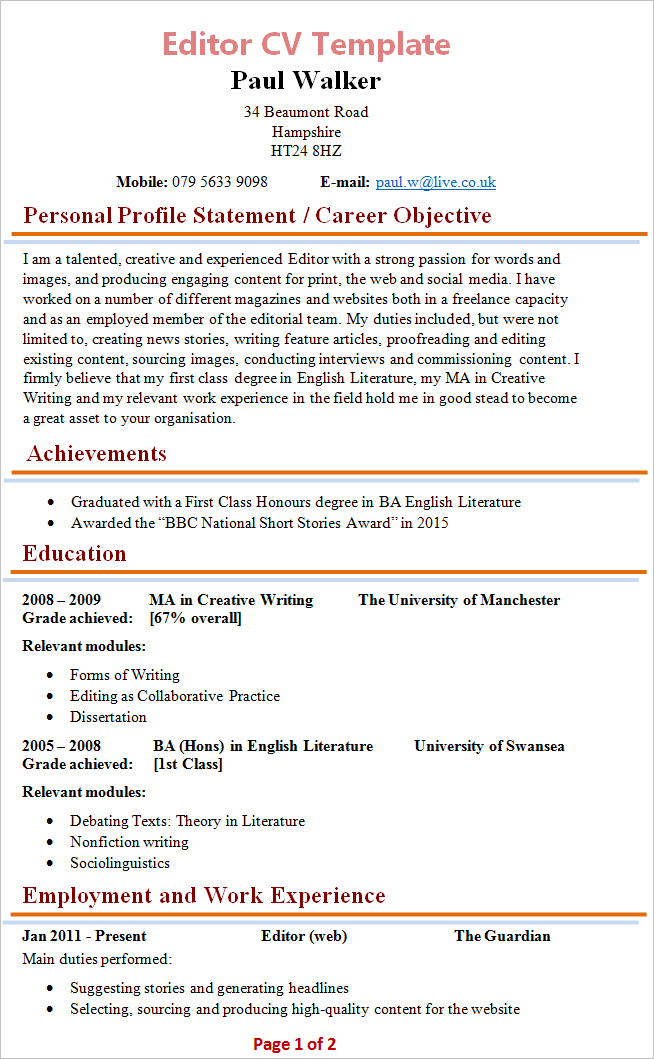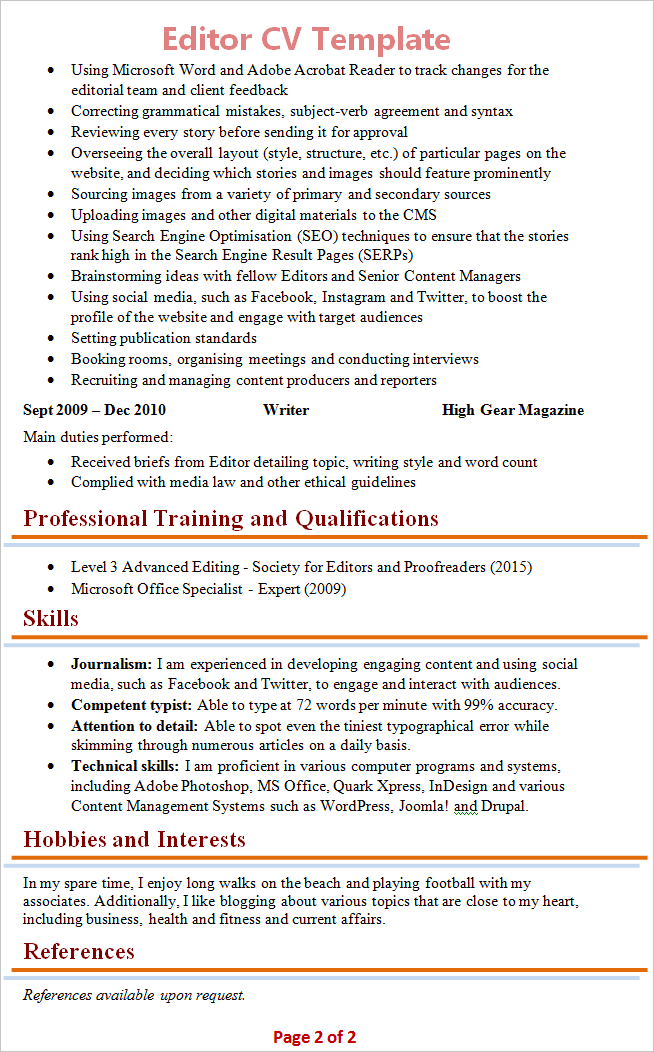 Sobhan Mohmand, CV Writing Expert
Sobhan Mohmand, CV Writing Expert  9 Nov 2023
9 Nov 2023
Are you looking to write your perfect Editor CV?
Crafting a compelling curriculum vitae is crucial in the competitive world of editing, where attention to detail and linguistic finesse are paramount.
Your CV should not only showcase your qualifications and experience but serve as a literary masterpiece in itself, reflecting your ability to communicate effectively.
In this article, we’ll guide you through the step-by-step process of creating a brilliant CV that will impress employers and secure you more job interviews. Let’s get started!
34 Beaumont Road
Hampshire
HT24 8HZ
Mob: 079 5633 9098 Email: [email protected]
I am a talented, creative and experienced Editor with a strong passion for words and images, and producing engaging content for print, the web and social media. I have worked on a number of different magazines and websites both in a freelance capacity and as an employed member of the editorial team. My duties included but were not limited to, creating news stories, writing feature articles, proofreading and editing existing content, sourcing images, conducting interviews and commissioning content. I firmly believe that my first-class degree in English Literature, my MA in Creative Writing and my relevant work experience in the field hold me in good stead to become a great asset to your organisation.
| 2008 – 2009 | MA in Creative Writing | The University of Manchester | Grade achieved: [67% overall] |
Relevant Modules:
| 2005 – 2008 | BA (Hons) in English Literature | University of Swansea | Grade achieved: [1st Class] |
Relevant Modules:
| 2003 – 2005 Results: English: A Science: B Maths: B | A Levels | Peak District College |
| Jan 2011 – Present | Editor (web) The Guardian |
Main duties performed:
| Sept 2009 – Dec 2010 | Writer High Gear Magazine |
Main duties performed:
In my spare time, I enjoy long walks on the beach and playing football with my associates. Additionally, I like blogging about various topics that are close to my heart, including business, health and fitness and current affairs.


Structure and format: The CV’s structure is a testament to thoughtful organisation. Distinct sections flow seamlessly, and the consistent formatting, including the use of bullet points, contributes to an aesthetically pleasing and reader-friendly document.
Tailoring to the job: The CV is a tailored fit for the editing role at hand. The candidate adeptly aligns their skills and experiences with the job description, demonstrating a nuanced understanding of the employer’s needs.
Personal Profile: The personal profile serves as an engaging prelude to the CV, providing a succinct yet comprehensive overview of the candidate’s editorial prowess. It skilfully captures the essence of the candidate’s passion for effective communication and their dedication to maintaining high editorial standards.
Qualifications: Academic achievements take centre stage, showcasing the candidate’s educational foundation in the field. Notably, the inclusion of specialised training underscores the candidate’s commitment to staying abreast of industry advancements.
Professional experience: Work history is narrated in reverse chronological order, providing a clear trajectory of the candidate’s editorial journey. Specific responsibilities and achievements are outlined with precision, offering a detailed insight into the candidate’s impact in previous roles.
In summary, this CV is impressive. With clear personal details, a compelling profile and a well-structured layout, it grabs attention. The inclusion of achievements and tailored content goes beyond the basics, showcasing the candidate’s expertise in editing.
How to save your CV as a PDF document:
The first section of your CV should contain your full name, contact details, including a professional email address and phone number, and your address. These details give employers a quick snapshot of who you are and how to reach you.
It’s recommended not to include overly personal information that could compromise your privacy or be irrelevant to the job.
Avoid including details such as your date of birth, marital status, religious beliefs, social security number or photographs, as they are not pertinent to your professional qualifications and might introduce unnecessary biases in the hiring process.
Similarly, omitting information about your children, health status and political affiliations, ensuring that your CV remains focused on your skills and experiences relevant to the role.
The personal profile on your CV serves as a snapshot of who you are professionally. It’s a crucial section that provides employers with a quick overview of your skills, experiences and career goals. Make it concise yet impactful, showcasing your unique strengths and what you can offer to a potential employer.
Related: How to write effective personal statements (with examples).
Editor personal profile example:
With a keen editorial eye honed through years in the industry, I bring a wealth of experience to the role of Editor. My tenure at Britain Publications saw me spearheading impactful content strategies, resulting in a 20% increase in audience engagement. Proven track record in enhancing readability and coherence, ensuring each piece meets the highest editorial standards. Ready to elevate your team’s content to new heights.
The achievements section in your CV is essentially a concise showcase of your career highlights. It encapsulates notable accomplishments such as awards, promotions and outstanding academic performance.
This section is your opportunity to spotlight key successes, providing a compelling snapshot of your professional prowess and making a compelling case for your candidacy.
In this section, you lay out your professional journey, including your job roles, responsibilities and achievements in each role.
It’s your chance to show off the skills and experience you’ve gained throughout your career, giving your potential employer a solid understanding of what you bring to the table.
Write this section in reverse chronological order, most recent jobs first.
Related: How to write the employment and work experience section of a CV.
| March 2018 – September 2021 | Senior Editor Wordsmith Publications Ltd. |
Main duties and responsibilities performed:
Editor duties to add to your CV
The education section of your CV outlines your academic background, including qualifications, institutions attended and relevant dates.
You can list qualifications such as A-Levels, vocational qualifications (e.g., BTECs), undergraduate degrees (e.g., Bachelor of Arts or Science), postgraduate degrees (e.g., Master’s or PhD) and any other relevant certifications or courses.
Related: How to write your degree on your CV.
| September 2018 – June 2021 | BA English Literature and Creative Writing | University of London | Degree Classification: 2:1. |
Subjects Studied:
| September 2016 – June 2018 Results: English Literature: A, Media Studies: B, History: B. | A-Levels | Birmingham College |
The professional training and qualifications section of your CV highlights relevant certifications, courses and specialised training you have undertaken to enhance your professional skills and knowledge.
For an editor, this may include qualifications such as a professional editing certification, courses in copyediting and proofreading, attendance at industry workshops on grammar and style and membership in editorial associations showcasing ongoing professional development.
The skills section of your CV is a crucial snapshot of your abilities as an editor.
It should highlight your proficiency in key areas such as editorial software (e.g., Adobe InDesign), attention to detail, excellent grammar and language skills, project management, adherence to style guides and your ability to collaborate effectively with authors and other team members.
10 useful editor skills to add to your CV
The personal interests section of a CV is a brief segment about you, outlining hobbies, activities or pursuits outside of work to provide a glimpse into your personality and interests.
As an editor, you can include hobbies in your CV that demonstrate skills such as attention to detail, creativity and a passion for language. Some suitable hobbies might include creative writing, reading, language learning, participating in writing groups or even involvement in editorial or literary events.
While including a personal interests section can add a personal touch to your CV, it’s generally optional, especially if you have a substantial amount of relevant professional experience. If your CV is already comprehensive with your work history, skills and achievements, adding a personal interests section might not be necessary.
The references section of your CV is where you provide contact details for individuals who can vouch for your professional capabilities and character.
Your referees should ideally be individuals who are familiar with your professional work and can speak to your skills, work ethic and character. Suitable referees may include former employers, colleagues or supervisors who can provide a credible and positive assessment of your abilities in the context of your career.
It’s worth mentioning that including the details of your referees on your CV is optional at this stage. Instead, you can simply state, “References available upon request.” This allows you to provide references when specifically requested by the employer, giving you better control over who contacts your referees and when.









